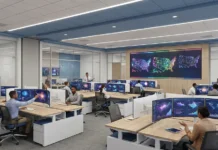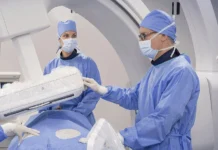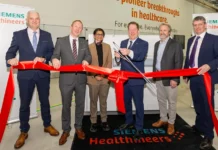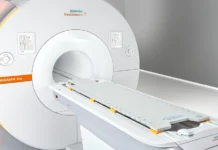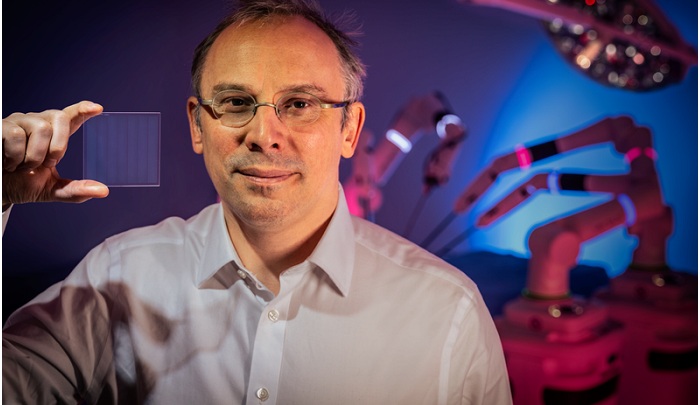CMR Surgical (CMR) – the global company that has developed the next-generation surgical robot, Versius®, today announced an engagement with Microsoft in a first for health data. Clinical data from Versius procedures was stored onto a small proof of concept glass platter, which can be safely preserved for more than ten thousand years, as part of the new ‘Project Silica’ trial by Microsoft.
CMR is dedicated to transforming the future of surgery and data is central to this mission. Through the Versius Surgical Robotic System and its wider digital ecosystem – including a registry and app – CMR is consistently collecting and analysing large amounts of anonymised data from its minimal access (MAS) – otherwise known as keyhole – surgeries. This data has the potential to help standardise surgery and ultimately improve patient outcomes.
Project Silica is a new archive storage technology from Microsoft, created specifically for the Cloud from the ground up. Once data is written inside the glass it will not decay and this opens up an exciting opportunity to challenge and completely rethink traditional storage system design.
While regular magnetic media can decay and be destroyed through a number of environmental factors such as EMP (electromagnetic pulse), water damage, heat, or abrasion, glass is not affected by EMP or water damage and is resilient to heat and abrasion. It can survive for tens of thousands of years without the data decaying.
Luke Hares, Chief Technology Officer of CMR commented: “Through this exciting trial with Microsoft, CMR has the opportunity to use a ground-breaking technology of the future to store a vast amount of clinical data safely and securely. This is important as collecting data across surgical practice will enable us to learn critical insights over time and realise our mission to make minimal access surgery available to everyone who could benefit. Working with Microsoft is a natural fit for CMR, as both companies are hugely passionate about realising the potential of data and technology to shape healthcare worldwide.”
Long term archival storage, enabled by Project Silica, permits the preservation of surgery data, including procedural videos and critical telemetric data. Over the long term, for example a surgeon’s entire career, this can be harnessed for future training and clinical study.
Jurgen Willis, VP Program Management, Microsoft, commented: “In this trial with CMR, Microsoft was able to demonstrate our innovation in long term archival storage. Long-term medical archival data can improve medical record management, enabling healthcare companies to help their patients more effectively. Working with CMR is an exciting milestone for Project Silica to learn more about long-term archival storage needs within the healthcare market.”
This trial with Microsoft comes at an exciting time for CMR Surgical having recently announced the introduction of the Versius Surgical Robotic System into two new major robotics markets, Australia and Germany. CMR continues to significantly increase its global footprint, with over 1,000 clinical cases completed to date.
About Project Silica
The demand for long-term data storage is reaching unprecedented levels, but the capacity of existing storage media is not keeping up. Operating at such scales requires a fundamental re-thinking of how we build large-scale storage systems, as well as the underlying storage technologies that underpin them.
In Project Silica, Microsoft is using recent discoveries in ultrafast laser optics and artificial intelligence to store data in quartz glass. The hard silica glass can withstand being boiled in water, baked in an oven, microwaved, scoured, demagnetised and other environmental threats. At room temperature, this durable long-term storage media has the potential to live for thousands to millions of years.
This opens up an incredibly exciting opportunity to challenge and completely re-think traditional storage system design, and to co-design the future hardware and software infrastructure for the cloud.
Long-term archival storage costs are driven up by the need to repeatedly transfer data onto newer media before the information is lost. Hard disk drives can wear out after three to five years. Magnetic tape may only last five to seven. Both the media and the equipment needed to do this continual upgrading are expensive. Glass storage has the potential to become better match for this long-term archival data because the data is only written into the glass once, and at room temperature the data will not decay.
As well as being plentiful, durable, and lasting for ages, the media in Project Silica greatly contributes to sustainability, as it requires no electricity or air conditioning in storage and never needs to be re-written.
The Versius® Surgical Robotic System
Versius® resets expectations of robotic surgery. Versius fits into virtually any operating room set-up and integrates seamlessly into existing workflows, increasing the likelihood of robotic minimal access surgery (MAS). The portable and modular design of Versius allows the surgeon to only use the number of arms needed for a given procedure.
Biomimicking the human arm, Versius gives surgeons the choice of optimised port placement alongside the dexterity and accuracy of small fully-wristed instruments. With 3D HD vision, easy-to adopt instrument control and a choice of ergonomic working positions, the open surgeon console has the potential to reduce stress and fatigue and allows for clear communication with the surgical team. By thinking laparoscopically and operating robotically with Versius, patients, surgeons and healthcare professionals can all benefit from the value that robotic MAS brings.
But it’s more than just a robot. Versius captures meaningful data with its wider digital ecosystem to support a surgeon’s continuous learning. Through the Versius Connect app, Versius Trainer and CMR clinical registry, Versius unleashes a wealth of insights to ultimately improve surgical care.
About CMR Surgical Limited
CMR Surgical (CMR) is a global medical devices company dedicated to transforming surgery with Versius®, a next-generation surgical robot.
Headquartered in Cambridge, United Kingdom, CMR is committed to working with surgeons, surgical teams and hospital partners, to provide an optimal tool to make robotic minimal access surgery universally accessible and affordable. With Versius, we are on a mission to redefine the surgical robotics market with practical, innovative technology and data that can improve surgical care.
Founded in 2014, CMR Surgical is private limited company backed by an international shareholder base.


